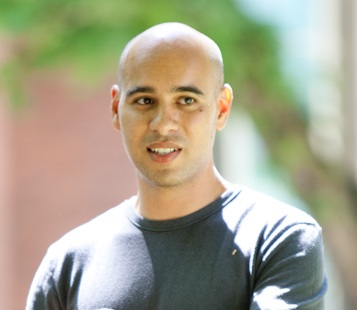The most common problem I’ve found in the people I’ve coached and worked with in my programs is a very fundamental problem:
Most people have the feeling that something is wrong with them. And it is heartbreaking.
Actually, most people would say that their problem is that they want to be more disciplined, more focused, better at sticking to their health habits, better at finances, more mindful … so more of something, or better at something else.
But underlying all of that is the feeling that something is wrong with us.
We are not disciplined enough. We’re not focused enough. We’re not fit enough. We’re not mindful enough. We’re not organized enough. We’re not good enough. We’re not enough. We’re never enough.
It breaks our heart, because we try our best, but we come up short. All of our efforts can’t solve the fundamental flaws in us, the parts that will never be good enough. There are parts of us we don’t want to face, that we don’t like, that we don’t want anyone to see. And so we hide it, cover it up with activity that shows how great we are. Maybe if we show how awesome we are, no one will notice the shameful parts.
The most heartbreaking thing is that nothing could be farther from the truth. Nothing is wrong with us. We are whole, we are good-hearted, we are beautiful and full of love.
In this article, I’ll offer a few ways to work with this heartbreaking delusion.
Where the Feeling Comes From
We form this feeling sometime in childhood or our teenage years — before this, we thought we were awesome and we felt whole with the world.
But somewhere, we got the message that we should be more. We should work harder, be more disciplined, be more beautiful, be better.
It came from parents, other relatives, school, peers, media, church. Everyone gave us this message, because everyone has bought into the fundamental agreement that we all should be better, more productive, more of everything.
It’s rooted in religion, in consumerism, in the fundamental fabric of our society.
It’s a flawed message, but it’s everywhere. We can feel it when we open social media and see all the ways other people are doing or looking better than us. That makes us feel worse, and reinforces our belief in our flawedness.
But Actually, We Aren’t Flawed
There’s nothing wrong with us. We’re not “perfect,” but any idea of perfect is based on some ideal, some set of expectations that have been created and that only serve to make us feel less than.
We’re not perfect, but we’re not flawed. We are good at our core. We are the embodiment of love. We are whole with the universe, if only we could see it.
Take yourself back to when you were six or seven years old, and you felt amazing. Maybe not all the time, but there were moments when you felt awesome. You were playing, imagining, creating, connecting with others or the world around you, full of joy and wonder and life.
This is the feeling of wholeness with the world, with yourself. It’s still there, inside you, but it’s covered in all the agreements you’ve taken in from the world around you that you’re flawed. Those agreements have been reinforced and taken as covenants, but we can break them and form new agreements.
The most important new agreement is that you are whole, you are love, you are good-hearted.
5 Powerful Ways to Work with This Flawed Feeling
So how do we start to shift? One small action at a time, we break the old agreements and start to form new ones.
Here are some powerful ways to start that shift — note that these aren’t steps in order, but different ways you can work with the feeling of something being wrong with you:
- Practice kindness & friendliness with yourself. This is such a key and transformational practice: you practice looking at yourself with gentleness and friendliness. Just like you might look at a loved one with the same gentleness and friendliness, or light up with warmth when you see one of your best friends. That same feeling, turned on yourself. All the time. Whenever you look at yourself or something you’ve done, turn on the warm light of kindness to yourself, of friendliness and gentleness. Let go of the old ways of harshness, and transform it into kindness and warmth. What would it be like to do this all the time?
- Use the pain as a path of transformation. When we feel that there’s something wrong with us, it can feel painful. But this pain can be useful — drop into your body and feel the pain, as a physical sensation. Where is it located? Get curious about how it feels. The pain, then, is opening you to the present moment, instead of being caught up in your cycles of thinking negative things about yourself. It’s opening you to feeling the tenderness of your heart as well. It can also open you to compassion — if you’re feeling this pain, can you imagine how many others feel it? Can you feel compassion for every other being who feels this kind of pain? Can you send them kindness and love, from your tender heart?
- See your basic goodness. At our core, we are good. This is my belief. We have good hearts, we want to be happy, we want to be kind to others, and we have a wide-open awareness, compassion and connectedness that is always available to us, if we can open up to it from our usual place of being caught up in self-concern. We can all practice seeing this goodness, and feeling it in our heart. Feel the compassion in your heart, that is always available. Feel the kind intentions, the love that emanates from your tender heart. This is your basic goodness, and you can practice seeing and feeling it in any moment. The more you practice with this, the more fundamental your trust in it will become.
- Practice self-compassion regularly. You can do this practice right now: feeling the pain of something being wrong with you, of being inadequate and unlovable … can you wish for relief from this pain? Feeling the stress and disappointment in your body, can you wish for a feeling of peace? Can you wish for yourself to be happy? This wish can be felt in the heart, when you practice. Notice this feeling, and cultivate it regularly by wishing for a relief to your pain and stress, wishing for your own happiness and peace. It will help to heal the pain of something being wrong with you.
- Use the self-doubt to open to curiosity. You might feel doubt about whether you’re doing something right, about whether you can do something, about how you’re living and who you are. That’s OK! Doubt and uncertainty about yourself are not bad things. In fact, if we let them, they can open us to curiosity: I don’t know if I’m doing something right, can I get curious about how I should do this? Can I get curious about what this doubt feels like? Can I get curious about the task or topic without needing to know exactly how to do it? You can open to curiosity in any moment — it’s a space of not-knowing, a recognition that knowing is fixed but not-knowing is wide open and space for possibility, creation, exploration, play, wonder.
As you can see, the place of feeling that something is wrong with you is just a starting place. You can use it to transform, to find gentleness and friendliness, to find compassion, to open to the moment, to see your basic goodness. You can use it to open yourself to curiosity, possibility, not-knowing, creativity, exploration, wonder and love.
“I wish I could show you…the astonishing light of your own being.”
~Hafez
Originally published on Zenhabits.net.
Follow us here and subscribe here for all the latest news on how you can keep Thriving.
Stay up to date or catch-up on all our podcasts with Arianna Huffington here.


